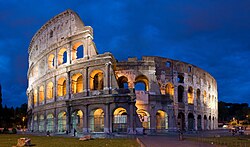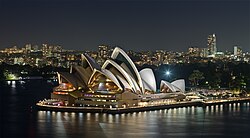
UNESCO's City of Film project is part of the wider Creative Cities Network.
Contents
Film is one of seven creative fields in the Network, the others: Crafts and Folk Art, Design, Gastronomy, Literature, Media Arts, and Music. [1]

UNESCO's City of Film project is part of the wider Creative Cities Network.
Film is one of seven creative fields in the Network, the others: Crafts and Folk Art, Design, Gastronomy, Literature, Media Arts, and Music. [1]

To be approved as a City of Film, cities need to meet a number of criteria set by UNESCO. [2]
Designated UNESCO Cities of Film share similar characteristics:

Bradford became the first City of Film in 2009, with Sydney joining in 2010. [3] [4] Sydney is home to Fox Studios Australia, the studio that brought The Matrix trilogy , The Great Gatsby , and The Wolverine to life. Its "pristine beaches" and "lush mountains" can also provide a backdrop for location shooting. [5]
Busan hosts an annual International Film Festival and is a "standard-setter" in the film world. [6]

Bristol is home to the Academy award-winning Aardman Animations. It is also home to The Bottle Yard Studios and the BBC Natural History Unit. [7] [8] Bristol is "packed with history and full of character," Yamagata is a "pleasant, bustling rural capital." [9] [10]
Yamagata hosts every two years an International Documentary Film Festival.
Potsdam is home to Babelsberg Studio, the largest film studio in Germany. It is also home to Film Park of Babelsberg and Film University of Babelsberg.
Mumbai is home to Hindi cinema.

As of 2025, the three countries that have multiple Cities of Film are England, Poland, and Spain, with two each. Only Brazil has three Cities of Film.
| City | Country | Year |
|---|---|---|
| Asaba | 2023 [11] | |
| Bitola | 2015 [12] | |
| Bradford | 2009 [13] | |
| Bristol | 2017 [7] | |
| Busan | 2014 [6] | |
| Cannes | 2021 [14] | |
| Cluj-Napoca | 2021 [15] | |
| Galway | 2014 [16] | |
| Gdynia | 2021 [17] | |
| Giza | 2025 [18] | |
| Ho Chi Minh City | 2025 [18] | |
| Kathmandu | 2023 [11] | |
| Łódź | 2017 [19] | |
| Mumbai | 2019 [20] | |
| Ouarzazate | 2023 [11] | |
| Penedo | 2023 [11] | |
| Potsdam | 2019 [21] | |
| Qingdao | 2017 [22] | |
| Quezon City | 2025 [18] | |
| Rome | 2015 [23] | |
| Santos | 2015 [24] | |
| São Paulo | 2025 [18] | |
| Sarajevo | 2019 [25] | |
| Sofia | 2014 [26] | |
| Sydney | 2010 [5] | |
| Terrassa | 2017 [27] | |
| Valladolid | 2019 [28] | |
| Vicente López | 2023 [11] | |
| Wellington | 2019 [29] | |
| Yamagata | 2017 [30] | |